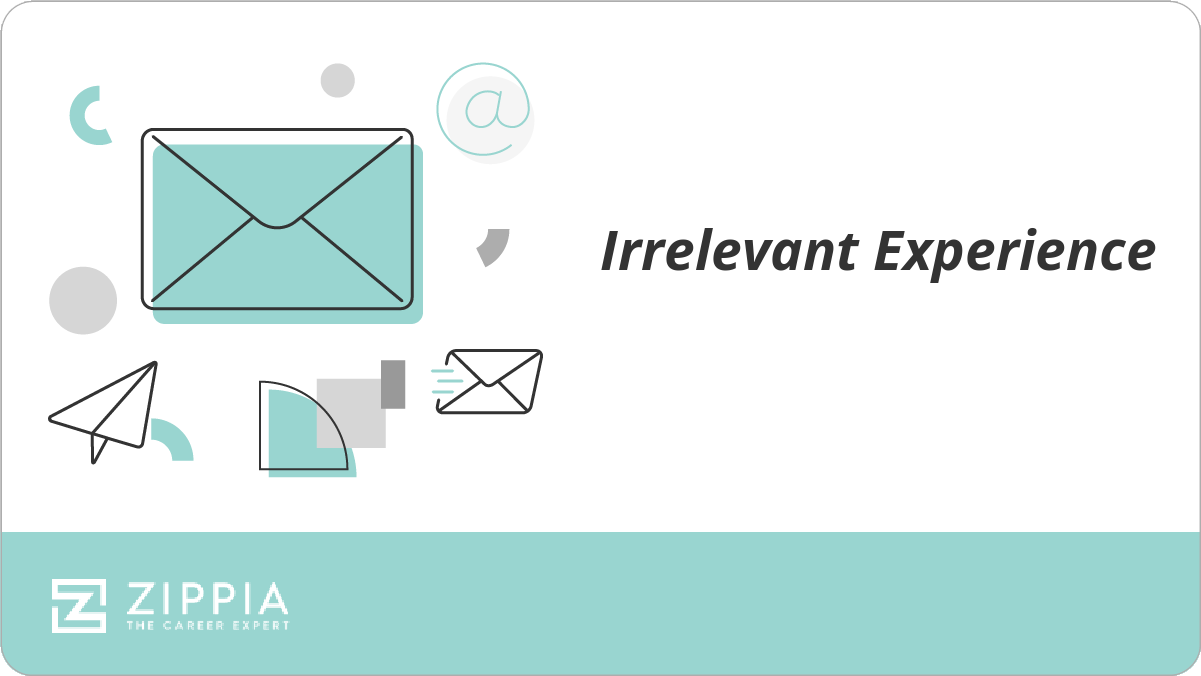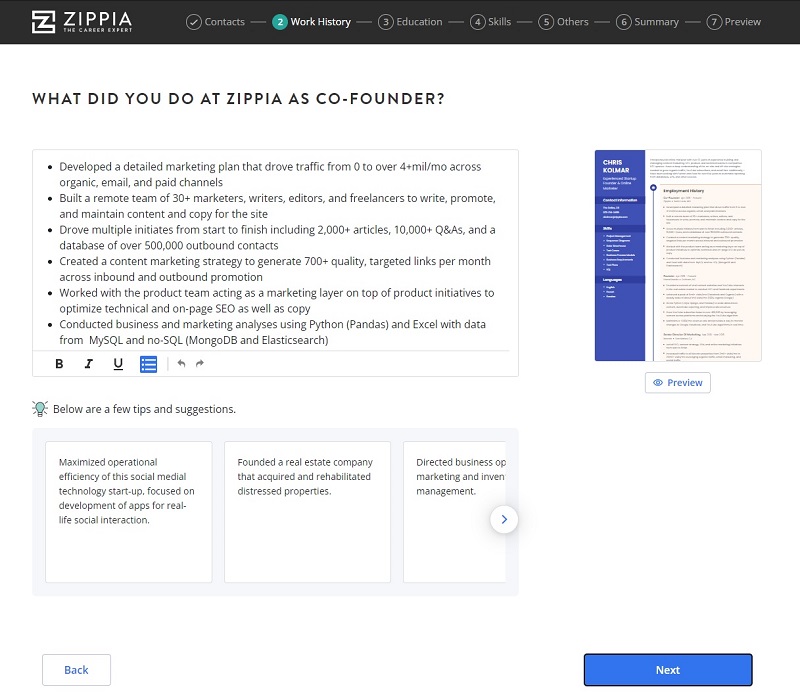- Parts Of A Resume
- How To Write A Resume
- Resume Skills Section
- Resume Objective Section
- Career Objective Section
- Resume Reference Section
- Resume Summary Section
- Resume Summary Example
- Resume Interests Section
- Address On Resume
- Relevant Work Experience
- Anticipated Graduation Date On Resume
- Education Section On Resume
- Contact Information On Resume
- Statement Of Qualifications
- How To List Publications On Resume
- Accomplishments On Resumes
- Awards On Resume
- Dean's List On Resume
- Study Abroad On Resume
- Resume Format
- Resume Templates
- General Resume Examples
- Resume Builder
- Resume Format
- Resume Margins
- Resume Header
- Work Experience On Resume
- Irrelevant Work Experience
- Listing Languages On Resume
- Volunteer Work On Resume
- GPA On Resume
- Resume Title
- Summary Of Qualifications
- Resume Picture
- Python Project On Resume
- Google Docs Resume Template
- Professional Bio On Resume
- Multiple Positions At Same Company
- Relevant Coursework Resume
- Where And How To Put Internships On Your Resume
- Professional Resume Formats
- Resume Types
- Should I Include Irrelevant Work Experience On a Resume?
- Relevant vs. Irrelevant Work Experience
- Update Your Resume Now To Get Your Next Job Faster
- Is Your Work Experience Actually Irrelevant?
- Making Irrelevant Experience Relevant
- Soft Skills
- Irrelevant Hard Skills
- Final Thoughts
- Sign Up For More Advice and Jobs
Well, you might have the 2-4 years of work history they’re looking for, but it isn’t necessarily “relevant.” What do you do in this situation?
In this article you’ll learn how to help your irrelevant experience work for you as much as possible.
Key Takeaways:
-
There might be times when you’ll want to include experience that you have in your job description, even if it isn’t relevant to the specific job you’re applying for.
-
You may also find that your “irrelevant” experience can actually apply to the role you’re applying for in a relevant way.
-
In addition to hard skills, soft skills are also highly valuable and can transfer across many positions and industries.

Should I Include Irrelevant Work Experience On a Resume?
The answer is, it depends. Here are some considerations that can help you decide what to do:
-
Does This Experience Add to my Value as an Employee? Before you cut any irrelevant experience from your resume, ask yourself if it could make you a more valuable employee.
If you’re deciding whether or not you should include your summer cleaning houses, future employers who are looking for someone to work in an office setting probably won’t care that you know how to clean.
What they might find appealing, though, is the extracurricular project you did where you learned how to code. Companies are interested in well-rounded, versatile employees, so if you could see the company needing a random skill you have, leave it on. You never know what might give you an edge over other candidates.
-
Do I Have the Space? If you’re changing career paths after 20 years in the workforce, chances are you’ll have more than enough relevant skills tofill a resume.
If you’re hurting for space rather than material, you can cut out anything that doesn’t demonstrate how you are a good fit for the job. Just be sure that this doesn’t mean you’re leaving worrisome gaps in your work history.
If you find yourself doing this, consider listing at least the position and the dates you worked there, even if you don’t have space to include many bullet points.
-
Do I Need To Fill Space? If you’re a recent graduate or just got out of themilitary, you may be struggling to fill out your resume in the first place. If this is the case, include your irrelevant work experience.
Work to show all the ways it can relate to the job you’re applying for and then leave it be.
The fact that you held a job while you took classes and still got a 3.8 GPA shows responsibility to employers, and your time in the military shows that you understand discipline and responsibility. These are skills that any employer looks for in future workers.
Relevant vs. Irrelevant Work Experience
There are very few companies who want to hire someone who has never done any aspect of the job they’re applying for. They want an employee who will lighten their workload rather than someone who creates more work because they need to be trained and monitored for an excessive amount of time.
Because of this, most job descriptions require at least a few years of relevant experience. This means the company wants to know that you’re prepared for the role, even if you haven’t worked in that exact position before.
The responsibilities and qualifications they list on the job description are the areas they want you to have experience in in order to be a viable candidate. Thus, the key to getting a second look on your resume is making sure that you’ve included as many of these qualifications as possible.
To do this, go through the job description and highlight every skill and area of expertise they’re looking for. Then go through your resume and find ways to highlight those skills and expertise in your work history section. Just make sure you stay truthful, and avoid simply copying the job description onto your resume.
Once you have those down, look at the qualifications that you don’t meet. If there are a large number, it might be time to move on to something else. If there are only a few minor boxes you don’t check, you might be able to get through to the interview stage without them, especially if you’re simply lacking the amount of work experience they’re looking for.
Update Your Resume Now To Get Your Next Job Faster

Is Your Work Experience Actually Irrelevant?
If you’re a college student applying for your first entry-level job, or if you’re an experienced professional looking for a career change, you may find that your resume is filled with work history that doesn’t necessarily apply to this new position.
The good news is that you probably have more relevant qualifications than you think you do. For example, you may not have experience working with clients in an interior design role like the one you’re applying for, but your work as a restaurant franchise manager did teach you how to handle customer needs and complaints. This is relevant experience, especially for a position that will bring similar customer service challenges.
As a college student, you may not have worked a full-time office job before, but you have successfully handled your class load and your part-time job. That takes organization, discipline, and hard work, which are skills that many companies look for in an employee.
You also might have participated in some extracurricular activities that gave you some valuable experience. Be sure to mention these as well.
Before you give up on a job application because you don’t meet a few requirements, take a harder look at the experience you do have. What did you learn, and how will it make you valuable in this new position? Work your resume to make sure that you communicate this.
Making Irrelevant Experience Relevant
When it comes to showing how your irrelevant experience will apply to the position you’re applying for, you’ll need creativity and tact. While you want to put your best foot forward, you should also avoid making your resume sound overly enhanced or made up.
The goal is to highlight the aspects of your work experience that will help you in this job, not to make your past positions sound more impressive than they actually were.
You should also make sure you’re as detailed as possible, sharing the results of your efforts rather than just saying that you “led a team” or “have good time management skills.”
Then again, there’s one more thing you can do.
Make a new resume and get more interviews.
Plus, a great resume will give you an advantage over other candidates. You can write it in our resume builder here. Here’s what it may look like:
Soft Skills
When you’re looking at the things you learned from your irrelevant work experience, you’ll probably realize that many of these were soft skills. Skills such as customer service, time management, and leadership are all valuable to employers
If you managed a shoe store and are now applying for a job in a different industry, for example, you might say something like this on your resume:
Handled over 1000 customer questions and complaints and worked with them until we found a satisfactory solution for all parties.
Increased sales by 3% by analyzing customer patterns and scheduling stocking around busy periods.
Managed 15 employee schedules to ensure the store was fully staffed while meeting employee needs and maintaining effective team groupings.
These soft skills are transferable across any industry, so make sure you communicate them on your resume.
This is especially important if you’ve been in the workforce for a while and are looking for a career change. If you’ve won any professional recognitions or awards, be sure to include those as well, as they will also speak highly of your abilities.
Irrelevant Hard Skills
While soft skills cross industries easily, it can be more difficult to show how your irrelevant experience gave you the hard, technical skills you need for the position you’re applying for. It can be done, however, with just a little more creativity.
Start by writing down all of the technical skills you have that match the job posting, and figure out where you learned each one. If you learned how to run social media ads and honed your Microsoft Office skills during an internship, mention it, even if it wasn’t a large part of your job.
If you worked as an administrative assistant for a financial company and are applying for a marketing position, for example, your resume may look something like this:
Analyzed email open rates to develop best practices for corporate email blasts, resulting in a 5% increase in open rates.
Monitored and managed company Facebook page, posting three times per week and responding to 15+ comments and questions every day.
Used advanced Microsoft Word skills to write and edit weekly company-wide updates.
Work to naturally use the same keywords that the job description did, but again, be sure that you aren’t stretching the truth about your skills.
Final Thoughts
You always want to match your application as closely as possible to the posted requirements for a job. If you don’t have many of the skills or experience listed in the requirements, it doesn’t mean you shouldn’t apply for the job.
Look at the experience that you do have and consider it from all angles to find ways of relating it to the requirements. In particular, look for soft skills that you’ve gained from your experience, as these can be relevant to a wide variety of positions.
- Parts Of A Resume
- How To Write A Resume
- Resume Skills Section
- Resume Objective Section
- Career Objective Section
- Resume Reference Section
- Resume Summary Section
- Resume Summary Example
- Resume Interests Section
- Address On Resume
- Relevant Work Experience
- Anticipated Graduation Date On Resume
- Education Section On Resume
- Contact Information On Resume
- Statement Of Qualifications
- How To List Publications On Resume
- Accomplishments On Resumes
- Awards On Resume
- Dean's List On Resume
- Study Abroad On Resume
- Resume Format
- Resume Templates
- General Resume Examples
- Resume Builder
- Resume Format
- Resume Margins
- Resume Header
- Work Experience On Resume
- Irrelevant Work Experience
- Listing Languages On Resume
- Volunteer Work On Resume
- GPA On Resume
- Resume Title
- Summary Of Qualifications
- Resume Picture
- Python Project On Resume
- Google Docs Resume Template
- Professional Bio On Resume
- Multiple Positions At Same Company
- Relevant Coursework Resume
- Where And How To Put Internships On Your Resume
- Professional Resume Formats
- Resume Types





